- Home
- Belva Plain
Daybreak Page 9
Daybreak Read online
Page 9
Unknowingly, Laura had come upon this parade. On her way back to the parking lot after shopping, she had been blocked here at the avenue. Now, fenced in by the crowd that had seemed to collect from nowhere—as crowds are always drawn to an ugly accident, she thought with scorn—she was unable to get away. She had, in fact, a ringside view of an event she had no wish to view.
The monument, a memorial to the dead young men of an old war, towered over the living men at its base. These, while waiting for the arrival of the parade, held American flags, hawked pamphlets, and shouted their slogans.
“Americans only! Whites only! Power! Power for Americans!”
As if someone had put some slimy insect or a wet garden slug down her back, Laura felt a shudder of disgust. Drab, angry, ignorant men! They were an insult to the flags they carried, an insult to the memorial before which now lay a wreath of dark green laurel leaves.
“My father wasn’t fighting for the likes of you when he died,” she muttered.
A woman standing next to her had overheard and, catching Laura’s embarrassed glance, nodded in sympathy.
“Nothing but troublemaking scum, that’s all they are.”
“Who are they? I mean, what’s the occasion today?”
“It’s a national convention of right-wingers. Far, far right, like the Crusaders and the Guardsmen, that type. They’re meeting this weekend at a motel out on the highway near where I live. My uncle’s with the police. He says there are six or seven hundred of them. He says they’re ready for trouble, too.”
“Who are? They or the police?”
The woman smiled. “Both, I should say.”
The vanguard of the procession now appeared. It began formation, lining the perimeter of the enormous circle. Slow feet trod with ceremonial solemnity, as if at some ancient religious rite. Only the words were incongruous to Laura’s ears. “Power! Power!” they chanted.
And the many voices were indeed powerful, thought Laura. In unison, the straight arms shot up, Mussolini’s arms and Hitler’s arms; she had seen them often enough in old movies, and a chill went down her spine.
A bugle blared, commanding attention to a small gray man who was trying to begin a speech. At the same time there was a happening on the other side of the circle, a pushing and jostling altercation that drew attention away from the speaker.
“Boo! Boo!” From all sides more voices rumbled. “Boo! Boo!”
And now came ominous roars. “Quiet, down there. We can’t hear. Shut up.”
Whose side were they on? It was impossible to tell.
“Bastards!”
“Shut up!”
“Can you make me? You shut up, shut your dirty mouths or you’ll find out what’s good for you!”
Far up in front a group of men began to fight. One fell to the ground, and women screamed. Laura looked at the faces close around her; there were menacing scowls and curiosity and fright. She began to look for a way out of the crowd, but they were pressing and pushing in both directions. She felt the terror of being trapped. A police car broke into the circle with its siren wailing. She looked about in terror, looked into the face of a rather decent-looking man as if somehow he might help her.
“Ma’am, this isn’t a good place to be,” he said. “Follow me. I’m going to try to wiggle through to the back and get over to that side street if I can.”
The pale sun strained through sultry clouds; in the humid air, fighting the pressure of stubborn, sweating bodies, all in uproar, all struggling, Laura struggled to follow the good citizen who had advised her. But the narrow passage he forged soon closed behind him and she lost him. The crowd surged and shoved, pushing her along, now here, now there.
The crowd was turning into a mob; people were trying to flee while others were forcing themselves closer to the center of the circle, where the action was. Anyone who stumbled in this melee would be trampled, and no one would care.
“Please may I squeeze through?” Laura cried, close to panic. “Please may I get through to the street, I need—”
And a terrible roar went up. “They’ve got the paddy wagon! They’re bringing the paddy wagon!” People were panicking. At the same time there were those who were pushing toward the front to join the attack on the police. Out of the corner of her eye, as she clutched a stranger’s jacket to keep from falling, Laura saw the man who had begun to speak, the gray little man—she was sure it was he—reach and snap the antenna from one of the police cars. A team of young fellows were rocking the cars; one, overturned, lay on its side with its wheels spinning. A club swung and a man toppled to the ground.
“They’re arresting them!” someone cried near her ear as she ran. “It’s the guy who laid the wreath. I’ve seen him before. There goes another into the paddy wagon.”
In the swirl of escape, nothing mattered. Fear had become frenzy. Laura’s breath was almost gone, and the heel of her right shoe had come off. But she fought her way through, losing her packages in her flight, and made her way to the side street. There for a few minutes she stood panting, leaning against a lamppost.
Then, recovering as her heartbeat came slowly back to normal, she made her way across the avenue, far beyond the turmoil, and headed for the parking lot.
A woman came panting up behind her. “Laura? I thought it was you over there. Wasn’t this awful? My heart was in my mouth. It still is. I’ve never been so terrified in all my life.” It was Lou Foster, the minister’s wife.
“Of course I’ve read about what crowds can do, but being in the middle of one like this is something else again. I could never have imagined it.”
“Johnson’s people,” Lou said contemptuously.
“I thought these were more Klan types.”
“Same thing. Johnson’s people talk more respectably, but as the Chinese say, they all eat from the same pot.”
A child came pedaling his tricycle down the sidewalk. From an open window came the whine of a vacuum cleaner. It seemed that such a street, lined by quiet houses and shady oaks, could not possibly be so short a distance away from the hideous explosion of hatred that was occurring still on the boulevard. And Laura, reflecting on the other woman’s words, said nothing for a moment.
“Yes, they’re all the same,” repeated Lou.
“My husband approves of Johnson. He says Johnson has nothing at all to do with the Klan. He’s a victim of malicious propaganda.”
“My husband could tell him differently. Johnson was a fighting tough. Now he’s remade himself into a middle-class gentleman. But you have only to look back ten years to when he worked for Fred Bartlett’s printing press. You remember Bartlett? He went from the Klan to an organization of his own, the Sons of Zeus, some kind of crazy religion that he founded. He was on the Secret Service list of dangerous persons. They’re all intertwined. No, I wouldn’t trust Johnson any farther than I can throw your beautiful piano, Laura.”
In the parking lot they paused before parting. Suddenly Lou said, “I’m worried, Laura. That black couple who bought the Blair house on Fairview Street are finally moving in and there’s so much angry talk going on that I’m worried. No, not worried. Scared.”
“What do you think is going to happen?”
“Heavens, people like you and me are the last to know. But there are plenty of agitators ready to make an issue out of something like this, you can be sure.”
Laura sighed. “Well, it’ll be a first for Fairview Street, that’s certain.” And recalling the fine classic facade of the old Blair place, she remarked that the new owners must be well off to think of maintaining it.
“I believe they are. She’s a schoolteacher, but he’s got a big executive job with Searle Computers. They’re from Cincinnati, I heard.”
“Well, let’s just hope all goes well,” said Laura.
Suddenly she remembered that she had no coffee ice cream, Tom’s favorite. He could eat a pint in five minutes. “Lou, I’ve got to rush. Tom’s coming home tonight. Bud went with a van to fetch him. An
d my aunts are driving up from Pensacola tomorrow to see him. They haven’t seen him since Christmas vacation.”
“Ah, a family dinner tomorrow.”
“A big one, and I’d better hurry home and get busy. Maybe it’ll take my mind off this horrendous morning.”
* * *
From the back veranda Laura and the aunts watched the touch football game on the lawn.
“Would you have believed that Clem at his age could keep up with Tom?” cried Cecile, proud of the husband she had, in late middle age or early old age, acquired.
Clem Hanson looked like the navy man he had been, tall, thin, silver-gray, and still crew-cut. A good-natured person, he accepted Lillian kindly when she moved to Pensacola to be near her sister. Indeed, Lillian often accompanied the couple at her own expense when they went traveling. Close knit, we surely are, thought Laura; to think they had all driven this distance to welcome Tom home from college!
Their coming made her aware of how much she missed the aunts, her twin mothers with their big hearts and their funny ways, the fussy domestic habits so out of keeping with their business persona, their determined, efficient hold on money, the getting and keeping of it.
“Tom gets handsomer every time I see him,” observed Lillian. “And so like your father, Laura. More and more, the older he gets, with those eyes, those dark, haunting eyes,” she said as if quoting poetry.
Laura smiled. It was true. Except when he was being stubborn, when his mouth got thin and hard, Tom was something to behold. And now, with his face laughing and gleaming as he swerved and darted, he gave delight.
Cecile clapped for Clem when he evaded Tom and clapped again when Tom caught up with Bud. Her pretty hair that had been pepper and salt was now mostly salt, yet she seemed to grow younger with each year of her marriage. Laura wondered if that was what happened when the marriage was wonderful.…
“It’s good to be here in the old house,” remarked Lillian, who had definitely grown older with each year. “Look at that magnolia! I remember the day I planted it. Nothing but a stick, it was, high as my waist.”
“I wish you’d stay longer,” Laura said.
“Can’t. We have to start back early in the morning. There’s a ton of packing to do. It’s not every day we take a three months’ cruise around the world.”
“I’m dying to see India. Remember when Francis Alcott was there and sent us all those marvelous pictures? And he brought you a sari, Laura. So lovely. Pale pink and gold, wasn’t it? Or was it blue and gold?” Cecile frowned slightly, concentrating on the memory. “Which was it, Laura? I can’t remember.”
Wrapped in pink gauze, she had gone dancing around her room, had draped it to expose one naked shoulder, paused like an odalisque in front of the mirror, loving herself.
“I don’t remember, either,” she replied with a little shrug.
“Yes, I can’t wait to see India most of all,” Cecile repeated. She was dreaming of white marble and temple bells. Not beggars, not dirt, nor smells, thought Laura. Nor heartbreak. Dear Cecile!
“I’m getting tired,” Bud said, tossing the ball toward the veranda steps.
He wasn’t tired at all. He was thinking of Timmy, who, with Earl at his heels, had been racing to keep up, although the others had been careful to favor him. And Laura wondered painfully whether Timmy realized how much they favored him. Probably he did, although he would try not to admit it to himself; Timmy was proud. Proud, like his father.
The close tie between those two was sometimes frayed. Bud’s kind of pride kept him exercising beyond the threshold of pleasure because he knew he tended toward fat, but he would never admit it. So it was that he never would admit his innermost feelings about Timmy, either, would never say that mixed with his fierce love there was also a bitter resentment. Why should this tragedy have come to him, Bud, who was capable of fathering a boy like Tom?
They should have had more children, another boy for Bud. Tom was grown and would go his way, as he should, she reflected now. But with Timmy in need of so much care, it hadn’t seemed like a good idea to add another responsibility to the family. And besides, who could have known how another child might turn out? The chance of a sibling’s being afflicted with Timmy’s sickness was one out of four, a terrifying ratio.
“I’m starved,” Tom said, clumping up the steps.
“Ten more minutes in the oven. Just time to shower. Then roast beef and a surprise dessert. One of your favorites, Tom.”
“Can’t be better than last night’s lemon pie. You spoil me, Mom.”
“As long as you know you’re spoiled, it’s okay.”
Indoors again, the women could never refrain from making some remark about the photograph of Thomas Paige, which they had to pass on the way in. They paused before it.
“He looks so stern,” said Cecile. “I don’t remember him looking so stern.”
“It’s the military cap that changes the face. Put that cap on Tom and he’d look different, too,” said Lillian.
“No, it’s because he was on his way overseas. Anybody would look stern.”
“Tom looks like that sometimes without going overseas.”
“Tom’s serious. Tom’s good stock.”
Thus refortified, content in the certainty of who and what the Paiges—and the Rices—were, the aunts proceeded toward the dining room and took their places, no longer at the head and the foot of the table because Bud and Laura sat there now.
Their complacency was contagious. Laura was feeling continuity. Her grandparents had bought this table in Ireland, a solid slab of West Indian mahogany, lustrous after thousands of patient rubbings and waxings. In one of these damask-covered chairs, her father must have sat through many a dinner’s conversation, boring to a child who had to wait while adults lingered over their second cups of coffee. And here in celebration of their engagement he must have brought Laura’s mother for a first dinner in this house; anxious to be approved, a young woman would have been careful to dress exactly right, neither too much up nor too much down. And here the young couple would have displayed their wedding silver …
Clem said, “I always tell Cecile that your boys have such fine manners. These days you seldom find a young man Tom’s age who knows enough to pull a chair out for a lady. All that’s gone by the board. I hate to see it.”
Laura smiles. “If there’s any credit due, it goes to Bud. He insists.”
“Well, good for him, then.”
Bud was pleased. “Tom’s been worth every bit of effort. And one of these days very soon, I’m going to show him what I think of him. I’m going to print ‘and Son’ on our sign after ‘Paige and Rice.’ ”
Laura amended, “And after that, someday you’ll put the ‘s’ after ‘Son.’ ”
“Of course, of course, when Timmy’s old enough,” Bud said. He turned to the aunts. “Gosh, I remember the day you took down ‘Paige and Company’ and replaced it with ‘Paige and Rice,’ gold letters on black. I felt like bursting inside. It was like yesterday,” he finished wistfully.
“There’ve been so many changes,” said Cecile. “More now, I guess, than in any century before us. I see big changes in this town every time I come back.”
Lillian remarked, “I heard on the car radio that you had quite a mess here yesterday.”
Clem said, “We saw it on television. It’s a disgrace. There’s no law and order anymore.”
“Laura was there,” Bud told them. “She could have been killed. Scared the life out of me when she told me. Tell them about it, Laura.”
She had been wanting to forget it, so she answered only, “It was awful. They were like savages.” What decided her to say more, she could not have explained, but glancing at Bud, she added suddenly, “This will have been only the beginning, though, if Jim Johnson wins. Only the beginning.”
“Nonsense!” Bud’s exclamation rang down the table. “You call Johnson a savage? Listen, he may be a bit too emphatic at times, a bit extreme, but if you listen carefully
and take apart what he says, you’ll find he makes a lot of sense. That group yesterday could have had nothing to do with him.”
Laura said stubbornly, “That’s not what I was told. I was told it was Johnson, and that when you look behind him, you’ll see the Klan.”
“Oh, for God’s sake, Laura, that’s ridiculous. Johnson’s got no more to do with the Klan than you have.”
“Of course, we’re in Florida,” Clem said. “But we keep in touch with what’s going on, and many of our friends from here have heard him, and they like him.”
“What do you say?” Clem asked Tom. “You folks at college all vote now at eighteen, so tell me, what are people your age saying?”
Tom had been waiting his turn, and was ready for it. “Divided,” he said promptly. “The people I go around with favor Johnson, naturally.” He grinned, catching Bud’s wink. “We wouldn’t be going around together, otherwise. I know people close to him, and they have a lot of respect for him. Mackenzie’s been slinging mud, that’s all he’s been doing. He won’t deal with the issues, racial quotas and busing, high taxes on people who work, so—”
Laura had to interrupt. “I’m not in favor of quotas or busing, either, and I don’t think Mackenzie is. He’s a conservative person, and I am, too, and that’s why I’m going to vote for him.”
Now Tom interrupted. “Mackenzie won’t talk about unpopular issues. He wants to please everybody. He won’t come right out and say that our government has been supporting a bunch of lazy bums who don’t want to work. That’s what this is all about.” And Tom ran his hand through his hair, which now fell slantwise like a black silk handkerchief over one-half of his forehead.
Bud clapped. “By God, he’ll be governor someday. Hasn’t my boy got what it takes? Right, Clem?”
Bud glowed and Clem approved. “Yes, Tom puts it very well,” and then in the kindly tone that people use when speaking to a very small child, he asked, “What are your thoughts on the subject, Timmy?”

 The Golden Cup
The Golden Cup Her Father's House
Her Father's House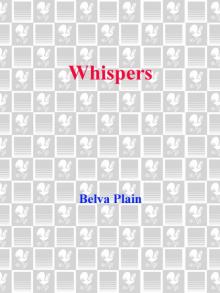 Whispers
Whispers Crescent City
Crescent City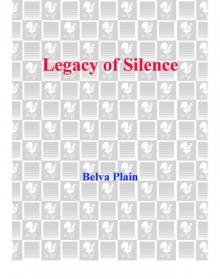 Legacy of Silence
Legacy of Silence Crossroads
Crossroads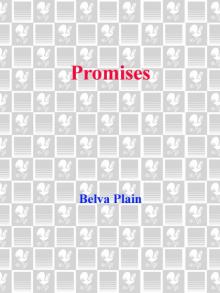 Promises
Promises After the Fire
After the Fire Tapestry
Tapestry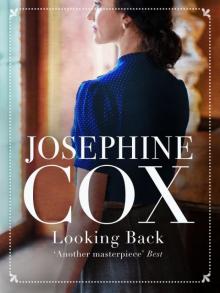 Looking Back
Looking Back Heartwood
Heartwood The Carousel
The Carousel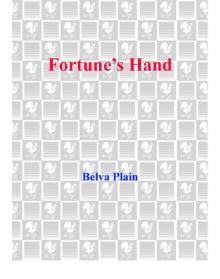 Fortune's Hand
Fortune's Hand Homecoming
Homecoming Random Winds
Random Winds Harvest
Harvest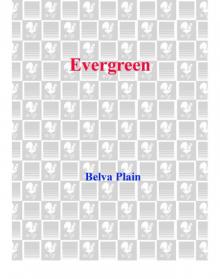 Evergreen
Evergreen Treasures
Treasures The Sight of the Stars
The Sight of the Stars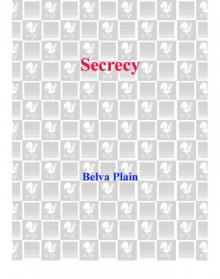 Secrecy
Secrecy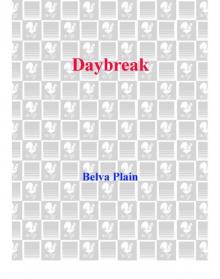 Daybreak
Daybreak Eden Burning
Eden Burning